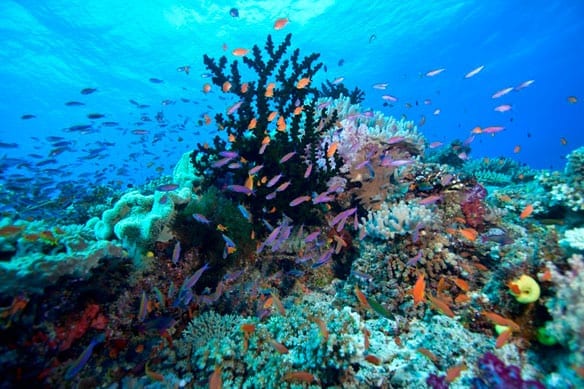
Scientists are taking the public with them to study the world’s coral reefs, thanks to 360 degree panoramas from Google’s underwater street-view format.
Results from this pioneering project – which will allow ecologists to harness people power to discover how coral reefs are responding to climate change – will be presented at INTECOL, the world’s largest international ecology meeting, in London this week.
Professor Ove Hoegh-Guldberg of the University of Queensland leads the research associated with the Catlin Seaview Survey. The Survey uses image recognition technology to automatically assess creatures on the seabed; so far it has already taken hundreds of thousands of images on the Great Barrier Reef and in the Caribbean.
“This new technology allows us to rapidly understand the distribution and abundance of key organisms such as corals at large scales. Our expeditions in 2012 to the Great Barrier Reef recorded over 150 km of reef-scape using these methods,” he says.
The project is now being expanded by building citizen science into the research, which he hopes will raise awareness and provide more data. “We are planning to involve online citizens to help us count a wide range of organisms that appear in the high-definition images. Anyone with access to a computer will be able to help us log creatures such as stingrays, turtles, fish and Crown of Thorns starfish.”
“Only 1% of humanity has ever dived on a coral reef and by making the experience easily accessible the survey will help alert millions of people around the world to the plight of coral reefs,” he says.
Professor Hoegh-Guldberg will also report findings from ground-breaking research on the impact of climate change on the Great Barrier Reef. At Queensland’s Heron Island research station, he has been running the first-ever long-term climate simulation experiments using computer-controlled systems to manipulate carbon dioxide levels and temperature to simulate past, present and future climate conditions around coral reefs.
“Coral reefs have had a hard time adjusting even to the conditions we find ourselves in today with respect to high carbon dioxide levels and sea temperatures. Our work is showing some interesting observations, such as the lack of adaptation of reef communities to the changes that have occurred up until the present,” he explains.
“Worse still, our results show that even under the most moderate climate change projections from the Intergovernmental Panel on Climate Change, most corals will struggle to survive and reefs will rapidly decalcify.”
The Latest Bing News on:
Underwater street-view
- Scientists Pinpoint World's Deepest Underwater Sinkholeon April 30, 2024 at 7:27 am
The Taam Ja' Blue Hole off Mexico's Yucatán Peninsula has been discovered to be "the deepest-known blue hole globally," according to new research.
- What to do if you have an underwater mortgageon April 24, 2024 at 5:00 pm
This is known as being underwater on your mortgage, and nearly 600,000 people in the United States are in this position, according to a recent report by Ice Mortgage Technology. We’ll explain ...
- It’s One of the Last Pristine Coral Reefs on Earth. Should We Be Visiting It?on April 24, 2024 at 12:15 pm
The Raja Ampat archipelago of Indonesia looms large in the imaginations of underwater adventurers. But by visiting its relatively untouched reefs are we protecting them—or threatening them?
- £20 million of pure cocaine found hidden 30ft underwater in ship’s hullon April 24, 2024 at 1:37 am
Italy. Police officers boarded the cargo vessel after it docked in Ravenna, on the coast of the Adriatic Sea in northern Italy, last week. Video footage, released on Tuesday (23 April), shows divers ...
- Here's a Pagani Utopia Going for a Swim on Flooded Dubai Streeton April 19, 2024 at 1:11 am
Only 99 examples of the $2.5 million Utopia will be made and this is definitely the bravest of all: viral video earns rave praise for crossing small body of wat ...
- Some bumblebees can survive underwater for up to a week, new study showson April 17, 2024 at 9:07 am
Sign up for CNN’s Wonder Theory science newsletter. Explore the universe with news on fascinating discoveries, scientific advancements and more. An experimental ...
- Queen bumblebees' unique ability to survive underwateron April 16, 2024 at 5:01 pm
Do you know that queen bumblebees can survive underwater for days? The surprising answer is yes. Queen bumblebees have shown an unexpected ability to survive underwater, according to recent research.
- Underwater UFOs display capability that ‘jeopardizes US maritime security,’ ex-Navy officer sayson April 15, 2024 at 12:59 am
Going back to focusing on underwater UFOs, Gallaudet said there's been legislative acknowledgment of their potential existence but "the literature on this subject is sparse and unsystematic." ...
- Striking sonar images show collapsed Baltimore bridge underwateron April 10, 2024 at 5:20 am
The U.S. Army Corps of Engineers on Wednesday released striking new 3D sonar images that capture an underwater view of the debris from the collapsed Francis Scott Key Bridge in Baltimore.
- New York Map Shows Where State Will Become Underwater From Sea Level Riseon April 9, 2024 at 2:00 am
Composite image of the Statue of Liberty submerged in the sea, with an inset of water on a New York City street ... NOAA Also underwater would be Astroland in Coney Island and the Rockaway ...
The Latest Google Headlines on:
Underwater street-view
[google_news title=”” keyword=”Underwater street-view” num_posts=”10″ blurb_length=”0″ show_thumb=”left”]
The Latest Bing News on:
Citizen science
- Bear-tracking study celebrates citizen science in Alberta's grizzly countryon April 28, 2024 at 4:30 am
An Alberta study celebrates how citizen scientists can help researchers better protect populations of the elusive grizzly bear. But critics say that without more government action, the species will ...
- 'Citizen scientists' help NASA discover over 1,000 new asteroids using Hubble Telescopeon April 27, 2024 at 4:30 pm
NASA said volunteers scanned 19 years' worth of images from the Hubble Telescope, using a new approach that could lead to other discoveries.
- Citizen science: Dept. of Conservation, Agriculture ask for help with black vulture studyon April 26, 2024 at 1:01 pm
MDC, USDA needs public’s help with black vulture studyThe Missouri Department of Conservation (MDC) is partnering with the U.S. Department of Agriculture (USDA) ...
- Across the Finish Line! Citizen Science Month Final Days.on April 26, 2024 at 10:42 am
One Million Acts of Science challenge met, but lots of important project work is still left!
- You might find a rare species in your backyard: How global citizen science contributes to biodiversity knowledgeon April 26, 2024 at 9:28 am
While it can be hard for us to notice as we go about our busy lives, cities are filled with indigenous plants, fungi, insects, spiders and other little creatures, as well as birds, frogs and reptiles.
- Gotham Whale, a New York City-based nonprofit, allows citizen scientists to assist in conservation effortson April 25, 2024 at 6:41 am
A whale-watching excursion that embarks straight from New York City offers passengers an opportunity to and assist in much-needed conservation efforts.
- ‘Not the only birder in the village’: how citizen science is the bedrock of tackling species losson April 20, 2024 at 3:59 pm
Birdwatching may have started out as a hobby, but active volunteers are helping bridge data gaps of threatened species and reaping real world outcomes as they go ...
- Citizen Scientists Will Capture DNA From 800 Lakes In One Dayon April 19, 2024 at 12:50 pm
The project aims to find species that have gone unnoticed by sampling the waters of hundreds of lakes worldwide for environmental DNA.
- Seychelles beach cleans demonstrate potential for citizen science to tackle marine litteron April 17, 2024 at 10:36 am
Volunteer clean-ups have resulted in almost nine metric tons of marine litter being cleared from beaches across the Seychelles, in what researchers have described as a powerful demonstration of the ...
- Leveling Up Science: How Gamers Are Advancing Biomedical Researchon April 16, 2024 at 9:05 pm
Major worldwide citizen science initiative advances understanding of the human microbiome. According to a recent study in Nature Biotechnology, leveraging gamers and video game technology can ...
The Latest Google Headlines on:
Citizen science
[google_news title=”” keyword=”citizen science” num_posts=”10″ blurb_length=”0″ show_thumb=”left”]










